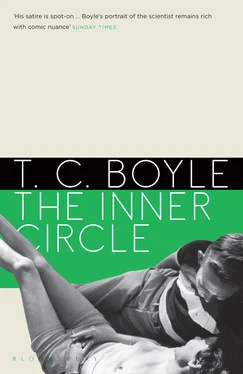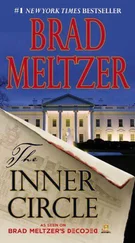“Milk?” Prok said. “Milk, did you hear me? I said are you all right?”
“Yes,” I said. “I’m fine.”
The motor hummed beneath the floorboards. Scenery flitted by. Prok cocked his head and shot me another glance. “Getting enough sleep? Because really, Milk, you look like one of the living dead—”
“No, I — well, not last night, I guess.”
He went off on a mini-lecture about the vital importance to health of the three telling factors — diet, exercise and sleep — and was in the middle of one of his long, artfully congested sentences when he suddenly caught himself. “But, John,” he said. “Are you — do you have something caught in your eye?”
I told him that I was allergic, that was all. “Hay fever,” I said.
He was silent a moment. Then he turned his face to me, his eyes shifting focus briefly and then darting ahead to the road. “A bit early in the season, isn’t it?”
In the end, I hadn’t confronted Iris — how could I? How could I have said anything without looking like a hypocrite? We’d eaten our dinner in silence, listening to the radio. She had a text— Modern British Poetry, my old marked-up copy — spread out on the table beside her plate, and she never lifted her eyes from it, though I didn’t see her turn the page, not once. When we were finished, I tried to get up and clear off the dishes, but she wouldn’t let me. “No, no,” she said, taking the dirty plate from my hand — I’d eaten nothing, the macaroni like sodden cardboard, though I’d chewed as if my jaw would break—“let me do it. You must be tired.”
Her face was bloodless, her hair hanging limp, and I didn’t want to think of what had happened to the curl she spent so much effort on every night and worked so hard to bring to perfection each morning. I was tired. So tired I could barely lift my arms from the table. “Sure,” I said. “Okay.”
I made it as far as the couch and just lay there with one hand laid flat across my forehead while the radio spat and crackled and the water ran in the sink. For a long while I listened to her move about the kitchen, the cabinets opening and closing, the hiss of the water, the clink of glass and crockery, and then I lit a cigarette and studied the ceiling. There was band music from somewhere, a variety show, the Chiquita banana jingle — I must have heard that ten times over. Finally, she came to me. I felt her there, standing over the couch, but I never turned my head. “John,” she said, “John, please,” and I could hear the emotion saturating her voice, the plea for absolution that made me stiffen and harden all the more — mineralizing, I was mineralizing like a stick of wood buried over the eons in the deepest layer of sediment. I said nothing. She made a speech then, tearful, punctuated by sobs — she didn’t mean to, it wasn’t anything, the madness of the moment and somehow she couldn’t resist him, Purvis, because he was so persuasive —but I never moved. After a while she went into the bedroom and shut the door.
Can I tell you now that I felt as if a stake had been driven through my heart? I knew why she’d done what she had — it didn’t take a psychiatrist to figure that out. She’d had one man in her life, just one, and I’d had Mac and Prok and she could only guess whom else. The whole project, the whole regime, demanded that she acquire experience — we looked up to the high raters, didn’t we, no matter how unbiased we tried to appear? I knew where the guilt lay. I knew who was at fault. But if I believed in what I preached, if I believed in my work — and I did, and still do, fervently — then I had no right to say J’accuse.
I went to bed late that night, so late there was the sound of birds stirring in the bushes outside the windows and a slow gray seep of light infiltrating the curtains. She was awake still. I saw her there in the bed and all the sadness of the world came to lodge in my throat, acidic and unforgiving, until I steeled myself and swallowed it down. What I wanted more than anything in that moment was to have her, to throw back the blankets, strip off her nightgown and bury myself in her.
She might have said my name, I don’t know, I don’t remember. But I remember this: we came together without preliminaries, without words, and I drove at her in an ecstasy of release and she responded in kind, fighting me, thrashing at me, furious with the sting of her guilt and the pleasure too, and all the while I was thinking she hadn’t run the tub, hadn’t washed Corcoran out of her, and he was right there with us, grinning like an actor.
Yes, and it felt odd too to be returning to Indianapolis, this time to sit with children from the local elementary school instead of some jaded prostitute and her string of faceless johns, and in the pure efflorescent light of day instead of in the shadows of the night. Prok had arranged the session with the principal and one of the kindergarten teachers, both of whom were friends of the research, and we’d modified the standard procedure to accommodate the children’s level of apprehension. Also, we were careful to get the parents’ consent beforehand — and the parents’ histories, as well — and we conducted the interviews in tandem and with at least one parent present so that there could be no hint of impropriety.
We arrived early, the children still in their classes, the stiff, hacked grass of the athletic field greening round the edges and the sun hanging bright over the playground and its idle swings and seesaws and the rigid superstructure of the monkey bars. The school’s principal — a Mr. McGuiniss, whose comfortingly unremarkable history we’d taken on our last trip during the diurnal hours when Ginger was unavailable — met us at the door and led us into his office. There was a flag, a stuffed owl, the crude, curiously mobile abstract paintings of very small children decorating the walls, and a window that gave onto the playground. “Dr. Kinsey,” McGuiniss said — he was small, bald, his fingertips stained with nicotine—“and Mr. Milk, welcome, and thank you for coming. We have, as you know, several students who’ve volunteered, and their mothers are here as well. Everyone is very excited.”
We began with two sisters, aged seven and five. The principal made his office available to us — he’d already furnished it with a few playthings and picture books to put the children at ease — and the girls’ mother ushered them into the room. She was a tall brunette, not unattractive, with prominent cheekbones and a mass of healthy-looking hair swept up atop her head and held in place with a pair of mother-of-pearl barrettes. I knew her age — twenty-nine — because I’d taken her history myself on our previous visit. (She was monogamous, married eight years, eager to experiment with coital positions and oral-genital contacts, but as yet very much a novice and fighting her husband’s resistance — he was a devout Catholic and typically repressed, and he was the only one of this particular cohort who’d declined to be interviewed himself.)
Prok and I rose to greet her, even as McGuiniss bowed out of the room with a sheaf of papers under one arm. “Mrs. Perrault,” Prok cried, taking her hand and flashing his smile, “so nice of you to come. You know my associate, Mr. Milk, of course. And now”—turning to the girls and giving a formal bow that was calculated to charm them—“who are these beautiful young ladies?”
The girls — Suzy was the younger, Katie the elder — both had their mother’s coloring and her outsized liquid eyes. They gave us prim little smiles, pleased to be the centers of attention, and yet they seemed a bit flustered too, uncertain as to what was expected of them. “I’m Katie,” the seven-year-old said. “And this is my sister.”
Читать дальше












